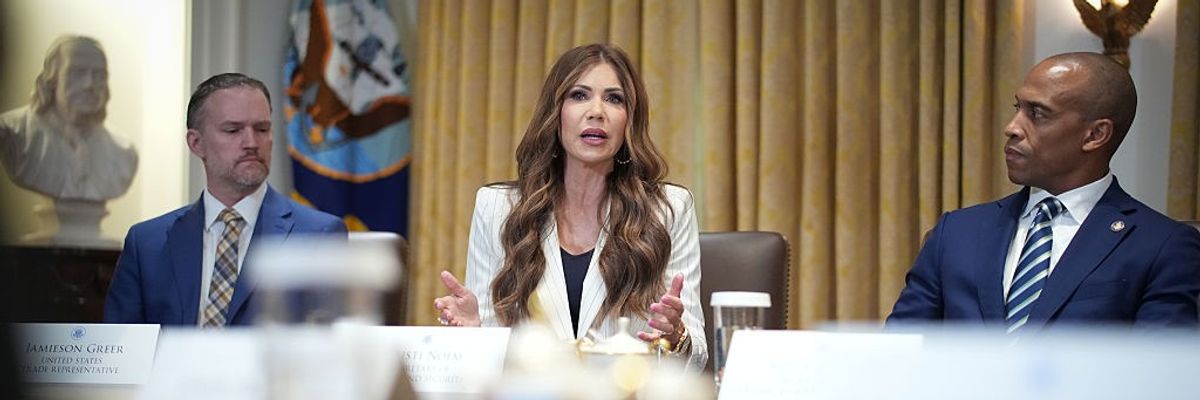U.S. Secretary of Homeland Security Kristi Noem renewed her call Wednesday to "eliminate" the Federal Emergency Management Agency, calling it "slow to respond" to the deadly floods that have killed more than 120 people in Texas over the past week.
But that "slow" response was the direct result of a policy put in place by Noem herself, according to four FEMA officials who spoke to CNN.
Last month, the network reported on a new policy introduced by Noem that required any contract or grant above $100,000 to cross her desk for approval.
The administration billed the move as a way of "rooting out waste, fraud, [and] abuse." But multiple anonymous officials, including ones from FEMA, warned at the time that it could cause "massive delays" in cases of emergency, especially as hurricane season began to ramp up.
That appears to be what happened in Texas. According to the four officials who spoke to CNN, "FEMA ran into bureaucratic obstacles" as a result of this requirement. Compared to the billions that are typically required to respond to disasters, officials said $100,000 is essentially "pennies."
FEMA officials said they were left to ask for Noem's direct approval on virtually every action they took in response to the catastrophic flood, which created massive delays in deploying Urban Search and Rescue Teams.
The sources told CNN that "in the past, FEMA would have swiftly staged these teams, which are specifically trained for situations including catastrophic floods, closer to a disaster zone in anticipation of urgent requests."
Multiple sources said Noem waited until Monday to authorize the deployment of these search and rescue teams, more than 72 hours after the flooding began. Aerial imagery to aid in the search was also delayed waiting for Noem's approval.
On Wednesday, Noem used these very delays to justify her calls to disband FEMA entirely.
"Federal emergency management should be state and locally led, rather than how it has operated for decades," she said. "It has been slow to respond at the federal level. It's even been slower to get the resources to Americans in crisis, and that is why this entire agency needs to be eliminated as it exists today, and remade into a responsive agency."
President Donald Trump said last month he is in the process of beginning to "phase out" FEMA and that it would begin to "give out less money" to states and be directed out of the White House.
He first took a hatchet to FEMA back in February using the Department of Government Efficiency (DOGE), which eliminated 2,000 permanent employees, one-third of its total staff.
Noem has also boasted about using FEMA funds to carry out Trump's mass deportation crusade, including allocating hundreds of millions from the agency to build the so-called "Alligator Alcatraz" immigrant internment camp in Florida, as well as other detention facilities.
Before a House panel last month, former FEMA Administrator Deanne Criswell noted that the administration's cuts have made it harder for FEMA to respond in disaster areas.
"It just slows down the entire response and delays the recovery process from starting," Criswell said. "If the state director asks for a resource, then FEMA needs to be able to quickly respond and mobilize that resource to come support whatever that is. They still need the staff that are going in there. And so when you have less people, you're going to have less ability to actually fill those senior roles."
The revelation that Noem's policy may have contributed to the slowdown has only amplified calls by congressional Democrats to investigate how Trump administration cuts to FEMA and other services like the National Weather Service may have contributed to the devastation.
"During disasters, every second matters," said Rep. Joaquin Castro (D-Texas). "Noem must answer for this delay."
Congressman Greg Casar (D-Texas) said this disaster in his home state highlighted the need for federal agencies like FEMA.
"Year after year, Texans face deadlier fires, freezes, and floods." Casar said. "As we continue to support first responders and grieving families after the terrible flooding, we will need investigations at every level of government of what went wrong and what could save lives in future."
"We must stop the dismantling of federal agencies that are supposed to keep us safe from the next disaster," he added.




